9 Podcast Interviewing Fundamentals To Make Your Podcast Awesome
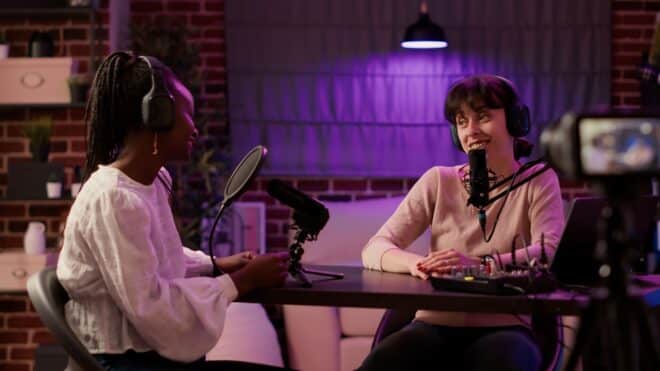
Last updated on January 7th, 2023
Podcasting is a powerful medium that can help you reach new audiences and bring stories to life. Podcast interviewing is about bringing someone else’s stories to life.
Not quite as easy. But…
Can Podcast Interviewing Techniques Be Learned?
Yes, podcast interviewing techniques can be learned by studying the fundamentals, a little bit of psychology, and practicing, a lot. It may seem awkward at first, but it is in fact a fun skill that can translate into many facets of your life.
Learning how to interview people and create a great podcast takes time and practice. That’s why today, we’re going over the fundamentals of interviewing so you can make your podcasts even better than they already are.
One of the best interview podcasts 2022 had to offer was Hot Ones with Sean Evans. He’s an amazing interviewer and has some of the best podcast interviews with celebrities on the internet. We’re going to look at his example several times throughout this article.
A Great Podcast Interview Is Well Researched
The more you know about your subject, the easier it will be for them to open up about themselves and their work. You’ll also be able to ask them questions that make them feel like they’re talking about something they love—which means they’ll feel more comfortable and be able to relax. Honestly, they’re going to feel engaged and that they’re being heard.
This will make for a better interview overall!
Have a Podcast Interview Checklist
Even short interview podcasts need a checklist. Especially if the subject matter isn’t in your wheelhouse. You don’t need to be a subject matter expert, and in fact, it’s better to know a little less than you’d like.
Be Curious
Know the material you want to cover ahead of time, and make sure you can weave that information into your podcast interview questions. Without forcing it.

You can do this by reading through their past interviews, looking at their social media posts, or even just Googling them. Once you have a good sense of who they are and what they stand for, it’ll be much easier for you to craft your questions in a way that makes sense to both parties.
Craft Meaningful Questions for You and Your Audience
You also need to make sure that your questions feel like they matter. That you care about them. That you know your audience and that your audience is going to care about the answer to your question. That you understand podcast interviewing.
Even if you don’t yet have podcast interviewing completely figured out, you just keep
If they don’t seem like they matter at all—either because they’re too boring or because they’re too hard—you might find yourself looking at a blank face instead of an engaging subject.
Make sure that whatever question you’re asking is interesting enough so that it doesn’t feel like an afterthought on either side of the table. That means you need to go deeper than whatever it is they’re there to talk about. You have to go deeper.
A Killer Interviewer Remembers Why They’re There
And that’s to ask great questions.
Be aware of the power dynamic in your conversation; don’t let yourself get too comfortable during an interview, and let down your guard because you think it will make for a more relaxed conversation! Remember: You’re still in charge here.
You’re driving the bus, and if you get star-struck and lose control, the whole thing can seem like a bit of a farce, boring, or otherwise just confusing.
This interview by Peter McCormack on What Bitcoin Did was one where he lost control, and it went a bit off the rails.
You don’t have to love or hate bitcoin (if you are interested in learning more about bitcoin the CryptoTab Browser is Chrome based and will earn you a bit in the background) to realize that.
This is a show I love, and he was the first to admit that it didn’t come out as he wanted. It happens to professionals, so remember, always be learning.
Ask open-ended questions
When you ask someone to name their favorite color, it’s not an interesting question because there is only one answer (and they probably already know what it is). But if you ask them how they feel about their favorite color, why they chose it, or what color means to them personally—that’s when things get interesting. Podcast interviewing is all about when things get interesting.
This kind of question doesn’t have an easy answer, so your guest will be forced to think more deeply and share more personal information with you and your listeners.
In the same vein…
Don’t ask leading questions!
Leading questions seem like they’re trying to guide your guest into saying what you want them to say. For example, instead of asking, “Do you think [something controversial]?” try asking, “How do you feel about [something controversial]?”
The latter gives your guest more freedom to let loose and divulge something nobody else may know.
Podcast Interviewing is About Letting Them Talk.
Don’t interrupt them while they’re trying to answer a question—let them finish their thought before jumping in with another question or comment of yours; this will make for a smoother podcast episode overall since it will be uninterrupted by any dead air time between responses from either party involved (you as host/interviewer vs guest/interviewee).
Use “why” as part of your questioning technique when asking questions. For example, you could start a question with “Why do you think that?” or “What makes you say that?” This will help your guest feel like they have more control over their responses and gives them a chance to elaborate on their answer before moving on to another question.
Use Active Listening
What this means is a creative podcast experience is going to make heavy use of active listening. You’re going to notice that in almost all great podcast interviews.
Ask about their experiences, not just their opinions. This is especially important if you’re interviewing someone who works in a specific field, like healthcare or law.
It’s easy for them to give you their opinion on a topic, but asking about their experiences, what helped form those opinions, will help paint a more accurate picture of what it’s actually like being in that line of work.
Master Active Listening with Udemy
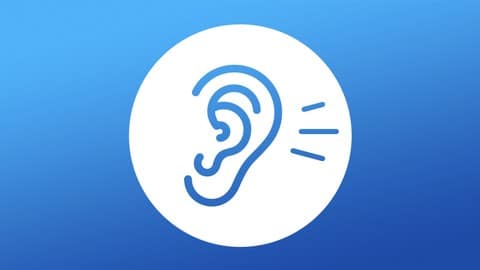
Watch the Podcast Interviewing Master Work
Take a look at Sean interviewing Matt Damon about why there aren’t so many indie movies getting made with big names.
Matt’s conjecture is that the fact nobody buys DVDs anymore means that filmmakers can’t count on that second major source of revenue. And as someone who worked at Blockbuster for several years before they went under, I tend to agree. That DVD (or even VHS) cash source meant a huge box office smash wasn’t necessarily the only determining factor.
It’s pretty obvious Damon didn’t expect that question and had to give it some thought. It also appeared as if he genuinely enjoyed the experience.
You can also ask them how they came up with those opinions since most people have had some sort of experience that led them down the path they’re currently on. Or maybe they’ve never really thought about it. Either way, getting the guest to think is important.
Keep Your Questions As Simple As You Can
Don’t ask questions that require a lot of background knowledge on the subject matter—keep it simple. If the guest gets a little too in the weeds, a little too wonky, get them to break down, in a creative, relatable way, what they’re trying to say.
Fire off analogies at will. And make sure to respond to your guest in your own words, clarifying what they just said. First, it helps your audience understand what’s being said, and nobody feels taken out of context the next day. It’s what Socrates would do.
Be aware of the power dynamic in your conversation; don’t let yourself get too comfortable during an interview, and let down your guard because you think it will make for a more relaxed conversation! Casual but professional is what you are looking for to get solid answers. How?
Keep on reading.
Remember: You’re still in charge here, so keep your hands on the conversational reins.
Make Eye Contact
This is how to interview someone for a podcast remotely. And it’s something even some of the bests got wrong during the pandemic.
It helps people feel heard and understood, so they’ll be more likely to open up about what really matters to them! It instantly builds charisma. Keeping eye contact is a huge part of active listening.

Pro tip – to keep eye contact remotely, you will look directly into your camera lens. Even if your show is audio only, having a video recording makes for better podcast interviewing.
Practice makes perfect here because it will feel awkward if you’ve never tried it before. The natural instinct is to look the subject in the eyes on the screen, but of course, that’s not where the lens is.
If you’ve never tried it, give it a go by filming yourself or on a call with a friend.
Keep it Casual.
Our friends at hot ones are casual but always professional. Sean’s interview with Dave Grohl of Foo Fighters is stellar.
I have to think they were a few sheets to the wind at the end of the interview, but it was never sloppy.
Casual conversations that don’t require anyone in the conversation to be a subject matter expert encourage the listener to hang in there with you. Even if they don’t fully understand what’s going on.
Skip the Obvious Questions.
If someone is doing a book tour or promoting some product, try to leave as much of that at the door as possible when crafting your questions.
Remember, they’ve probably heard it all before, and it makes for a dull experience. For everyone involved.
If you’ve ever seen a movie press junket go off the rails with the interviewer getting played for a fool, that’s usually why. They’re asking a question that’s been answered a thousand times that day alone.
It makes you, as the interviewer, look like a moron because your subject knows their material back to front. You have to bring something new to the table.
Watch this professional interviewer savaged by Robert Downey Junior for his, let’s call them, lackluster podcast interviewing skills. Well, interviewing skills generally.
Again, our boy Sean Evans will get podcast guests to openly remark about how deep a dive he did or what a good question that is. He only has so many hot wings, so he never burns a sauce (pun intended) on some obvious question nobody will care about.
Conclusion
We hope that these tips have helped you to learn about the best way to interview someone for your podcast. We throw a lot of attention Joe Rogan’s way on this site, and he’s a great interviewer as well, but for my money, it’s Sean Evans who comes out on top.
Watch and listen to how he improves the conversations season after season. He is learning to implement these skills to create compelling content with just about every guest he has on.
If you follow them, we’re sure that your listeners will be impressed by how much more engaging and informative your episodes are! If you want to learn more about active listening and how to get it done quickly, check out this excellent course on Udemy by clicking the link below.






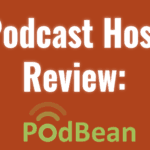
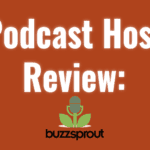
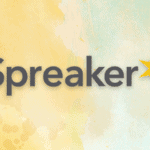





Comments
Comments are closed.